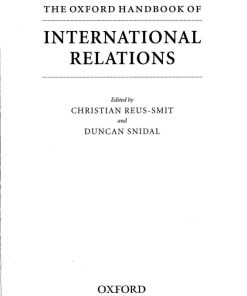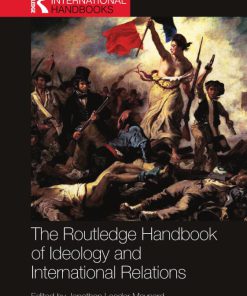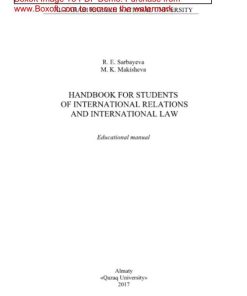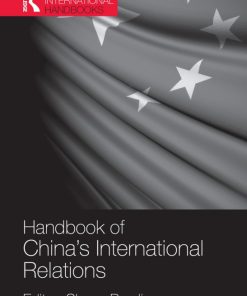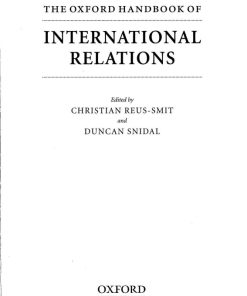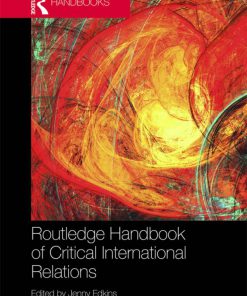Routledge Handbook of Ethics and International Relations 1st edition by Brent Steele,Eric Heinze 9780429761874 0429761872
$50.00 Original price was: $50.00.$25.00Current price is: $25.00.
Authors:Steele, Brent J. (Editor); Heinze, Eric A. (Editor) , Series:International Relation [17] , Author sort:Steele, Brent J. (Editor) & Heinze, Eric A. (Editor) , Languages:Languages:eng , Published:Published:Feb 2020 , Publisher:Routledge
Routledge Handbook of Ethics and International Relations 1st edition by Brent Steele,Eric Heinze – Ebook PDF Instant Download/Delivery.9780429761874,0429761872
Full download Routledge Handbook of Ethics and International Relations 1st edition after payment
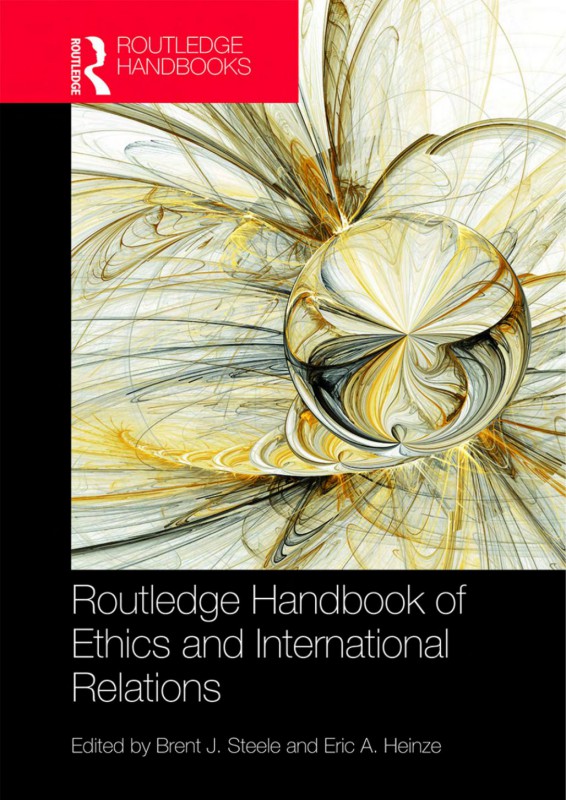
Product details:
ISBN 10:0429761872
ISBN 13:9780429761874
Author:Routledge
Ethics and International Relations (IR), once considered along the margins of the IR field, has emerged as one of the most eclectic and interdisciplinary research areas today. Yet the same diversity that enriches this field also makes it a difficult one to characterize. Is it, or should it only be, the social-scientific pursuit of explaining and understanding how ethics influences the behaviours of actors in international relations? Or, should it be a field characterized by what the world should be like, based on philosophical, normative and policy-based arguments? This Handbook suggests that it can actually be both, as the contributions contained therein demonstrate how those two conceptions of Ethics and International Relations are inherently linked. Seeking to both provide an overview of the field and to drive debates forward, this Handbook is framed by an opening chapter providing a concise and accessible overview of the complex history of the field of Ethics and IR, and a conclusion that discusses how the field may progress in the future and what subjects are likely to rise to prominence. Within are 44 distinct and original contributions from scholars teaching and researching in the field, which are structured around 8 key thematic sections: Philosophical Resources International Relations Theory Religious Traditions International Security and Just War Justice, Rights and Global Governance International Intervention Global Economics Environment, Health and Migration Drawing together a diverse range of scholars, the Routledge Handbook of Ethics and International Relations provides a cutting-edge overview of the field by bringing together these eclectic, albeit dynamic, themes and topics. It will be an essential resource for students and scholars alike.
Routledge Handbook of Ethics and International Relations 1st Table of contents:
1 A History of Ethics in International Relations
Introduction
The Canon of Ethics in International Relations
Ethics in the Founding of the Discipline of Ir
Ethics in Ir in the Cold War
Ethics in Ir After the Cold War
Conclusion
Notes
Part I Philosophical Foundations
Philosophical Foundations of International Ethics
Notes
2 Kantian Themes in Ethics and International Relations
Introduction
Kantian Constructivism and International Relations
The Relationship Between Domestic and International Justice
Conclusion
Notes
3 Global Egalitarianism: Cosmopolitanism and Statism
Introduction
What is Global Egalitarianism?
Cosmopolitan Egalitarianism
Arguing for Cosmopolitan Egalitarianism
Statism
Two Statist Arguments
Statism Versus Cosmopolitanism
Conclusion
Notes
4 Collective Responsibility and Joint Criminal Enterprise
Introduction
Collective Responsibility
Collective Liability and Joint Criminal Enterprise
Justifying Joint Criminal Enterprise
Conclusion
Note
Bibliography
5 Constructing Realities in International Politics: Latin American Views on the Construction and Implementation of the International Norm Responsibility to Protect (R2P)
Norms, Ethics, and Constructivism in Ir: Introduction
Norms Construction in an International Historical Context
The Process of Construction of R2P and Its Divergent Views in the Latin American Region
The South American Divergences on the Application of R2P: The Cases of Brazil, Colombia and Ecuador in the Context of the Libyan Conflict
Conclusion
Notes
6 Agency, Explanation and Ethics in International Relations
Introduction
Moral Responsibility
Agency and Explanatory Structure
Agency in Realism and Constructivism
Institutional Agency, Answerability and Moral Responsibility
Notes
Part II International Relations Theory
International Relations Theory: What Place for Ethics?
Introduction
Realism, Ethics, and the ‘science’ of International Relations
Values, Ethics, and Critical Theory
New Paradigms and Emerging Work
Conclusion
Notes
7 Hunting the State of Nature: Race and Ethics in Postcolonial International Relations
Introduction
Postcolonial International Relations and Ethics
Hunting the State of Nature
Different Ontological Starting Points for Ir Theory
Conclusion
Notes
8 Social Constructivism and International Ethics
Introduction: Norms as Social Facts and Norms as Ethical Values
The Exclusion of the Ethical From Early Social Constructivist Research
The Integration of the Ethical and the Empirical in Social Constructivist Norms Research
The Challenges and Opportunities in Fusing Normative and Empirical Research on International Norms
Notes
9 Truth and Power, Uncertainty and Catastrophe: Ethics in International Relations Realism
Introduction
Classical Realism: The Truth of Power and the Problem of Uncertainty
The Power of Truth: Neorealism and the Problem of Nuclear Catastrophe
Uncertain Truths and the Catastrophes of Power: Ethical Reinvigorations of Realism
Conclusion
Notes
10 Ethics and Feminist International Relations Theory
Feminist International Relations Theory
Feminist Relational View of Agency
Feminist Ethics and Ir
Feminists Rethinking Security in Building Peace
Conclusion
Notes
11 Critical International Ethics: Knowing/Acting Differently
Outside International Ethics: Problem-Solving Versus Critical Theory Approaches to Ethics in International Relations
Thinking Ethically: Critical Theoretical Engagements
Conclusion
Notes
Part III International Security and Just War
Security and the Ethics of War
Introduction
Security
War
Conclusion
Notes
12 Morgenthau and the Ethics of Realism
‘A Norm is Not a Wish or an Invitation’
The Ethics of Evil and Moral Courage
The Ethics of Responsibility and the Lesser Evil
The Twilight of International Morality and the Articulation of the Moral Dignity of the National Interest
Conclusion: Realist Ethics Beyond the National Interest?
Notes
13 Ethics and Critical Security Studies
Introduction
The Contours of Critical Security Studies
Conclusion: A Contribution to Normative Political Theory?
Notes
14 Tradition-Based Approaches to the Study of the Ethics of War
Introduction
Western Tradition-Based Ethics of War
Islamic Tradition-Based Ethics of War
Limits of the Tradition-Based Approach
Notes
15 How Should Just War Theory Be Revised? Reductive Versus Relational Individualism
Revisionisms
Preview
A Combat Scenario of Armed Humanitarian Intervention
A Scenario of Interpersonal Killing in Ordinary Life
Three Reductive Claims
Can a Group Be Reduced to Its Individual Members?
Can Moral Rules Governing a Group Be Reduced to Moral Rules Governing Its Members?
Can Moral Rules Governing Combatants Individually Be Reduced to Moral Rules Governing Ordinary Persons Individually?
Reductionism Versus Derivationism
Notes
16 Critical Approaches to the Ethics of War
Critical Theory and Problem-Solving Theory
Critical Approaches
Critical Approaches and the Ethics of War
Conclusion
Notes
Part IV Justice, Rights and Global Governance
Ethics and Institutions
Institutions
Liberalism
Contestation
Notes
17 Historical Context
Introduction
Origins and Early Years
World War Ii and the Early Cold War
The Late Cold War Period and Its Aftermath
Ethics and Ir Today
Notes
18 Justice: Constitution and Critique
Introduction
Constituting Justice
Liberalism, Justice, and International Ethics
Conclusion
Notes
19 The Ethical Terrain of International Human Rights: From Invoking Dignity to Practising Recognition
Introduction
The International Human Rights System
The Moral Architecture of International Human Rights
Struggles for Dignity and the Politics of Rights Recognition
Conclusion
Notes
20 International Law and Ethics
Global Constitutionalism
Cosmopolitanism
Critical Legal Theories
Feminist Approaches to International Law and Ethics
Conclusion
Notes
Part V International Intervention
Ethics and International Intervention
Notes
21 Historical Thinking About Human Protection: Insights From Vattel
The Duty to “Perfect” Strangers
Weighing Duties to Strangers Against Duties to One’s Own Population
No Right to Impose Perfection on Unwilling Others
Intervention Against Tyranny is Permissible
Conclusion
Notes
22 The Global Ethics of Humanitarian Action
Humanitarian Boom
The Emergence of Humanitarian Organizations
The Evolution of Humanitarian Terminology
Humanitarian Law and Humanitarian Principles
Moral Problems in Humanitarian Action
Ethical Limits—Relief and Development?
What Next for Humanitarian Ethics?
Notes
23 The Responsibility to Protect: The Evolution of a Hollow Norm
Introduction
‘Many Grounds for Optimism About the Future of R2P’?
Explaining R2P’s Popularity
Conclusion: ‘It Cannot Fail’
Notes
24 Right Intent in Humanitarian Intervention
Categorization and Justification
Just Cause and Intent
Conclusion
Notes
Part VI Environment, Health and Migration: The Ethics of Vulnerability
The Ethics of Vulnerability in International Relations
Introduction
Constructing Vulnerability, Constructing Ethics
Overview of Theme
Notes
25 Transnational Migration and the Construction of Vulnerability
Introduction: The Vulnerable Child Migrant
Image, Language, Body: The Ethics of Vulnerability and Global Youth
Global Youth
An Extra/Ordinary Ethics
Mobility “Outside Politics”
Vulnerability, Childhood, and the Nation
Presenting and Resisting Vulnerability
Conclusion
Notes
26 At a Crossroads: Health and Vulnerability in the Era of Hiv
Introduction
International Relations and the Politics of Global Health
The Political and Ethical Dimensions of Vulnerability
Hiv and Embodied Vulnerability
‘On the Other Side of the Road, No Arvs’: The Uneven Terrain of Vulnerability
Global Health Gatekeepers and Embodied Vulnerability
Conclusion
Notes
27 Climate Change, Sustainable Development, and Vulnerability
Introduction
The Ethics of Vulnerability and Sustainable Development
Vulnerable Populations and Sustainable Development in an Era of Climate Change
Vulnerability and the Pillars of Sustainable Development
Critiques of Vulnerability in Sustainable Development
Looking Toward the Future
Notes
28 Climate Change and Island Populations
Introduction
Small Islands and Climate Governance
Small Islands and ‘Climate Change Migration’
Climate Migration as a Security Threat
Enviroracism
Immobility
Conclusion
Notes
Part VII Ethics and the Global Economy
International Political Economy and the Ethics of a Global Economy
Introduction: The Politics of a Global Economy
Beyond Economics: History, Power, Agency
Two Ontologies of Ipe
The Ethics of the Global (Political) Economy
Notes
29 The Ethics of Alternative Finance: Governing, Resisting, and Rethinking the Limits of Finance
Perspectives on ‘Post-Crisis’ Finance
Emerging Alternative Financial Practices
P2P Lending and the Ethics of the Alternative
Conclusion
Notes
30 Decolonial Global Justice: A Critique of the Ethics of the Global Economy
Introduction: The Coloniality of Global Justice Theory
Informal Imperialism and Global Injustice
The Imperial Horizons of Global Justice Theory
Global Justice Theory and Decoloniality
Notes
31 Gender, Nature, and the Ethics of Finance in a Racialised Global (Political) Economy
Introduction
The Ethics of Finance
Ethics, Gender, and Finance
‘Natural’ Actors in Finance
Contesting Western Rationality? the ‘Natural’ Actor in Islamic Finance
Conclusions: Everyday Finance, Gender, and Ethics
Notes
32 Biofuels and the Ethics of Global Governance: Experimentalism, Disagreement, Politics
Introduction: The Everyday Ethics of Global Governance
Experimentalist Governance
Transnational Eu Biofuels Regulation
The Everyday Politics of Environmental Ethics
Conclusion
Notes
Part VIII Religion and International Ethics
The Significance of Religious Ethics in International Politics
Notes
33 Adam Smith’s Ambiguous Theodicy and the Ethics of International Political Economy
The Symbolic Structure of Theodicy
Adam Smith’s Complicated and Incomplete Theodicy
Notes
Bibliography
34 Religion, Emotions and Conflict Escalation
Introduction
The X-Factor of Religion
Collective Emotions and Conflict
Connecting Emotions to Securitization
Concluding Remarks: The Study of Ethics is Also a Study of Emotions
Notes
35 Solidarity Beyond Religious and Secular: Multiple Ontologies as an Ethical Framework in the Politics of Forced Displacement
Introduction
The ‘Refugee Crisis’ and Secular Assumptions
Conceptualizing Ontological Injustice
Multiple Ontologies as an Ethical Framework
Notes
36 Ethics From the Underside
Towards an Ethics of Deeds
Towards an Ethics of Elevation of African Descendants and Other Marginalized Communities
Towards an Ethics of Repair
Conclusion
Notes
37 Ibn Khaldun and the Wealth of Civilizations
Introduction
Cosmology
Philosophy of History
Political Economy
Conclusion
Notes
38 The Futures of Ethics and International Relations
Environment, Climate Change and the Non-Human
The Decolonial and Postcolonial Challenge
The Unexceptionality of Complex Violence
People also search for Routledge Handbook of Ethics and International Relations 1st
routledge handbook of ethics and war
the routledge handbook of ethics and public policy
the routledge handbook of social work ethics and values
the routledge handbook of the ethics of human enhancement
the routledge handbook of the ethics of discrimination
You may also like…
eBook PDF
Handbook of Critical International Relations 1st Edition by Steven Roach 1788112881 9781788112888
eBook PDF
Handbook of China’s International Relations 1st edition by Shaun Breslin 9781136938450 1136938451



